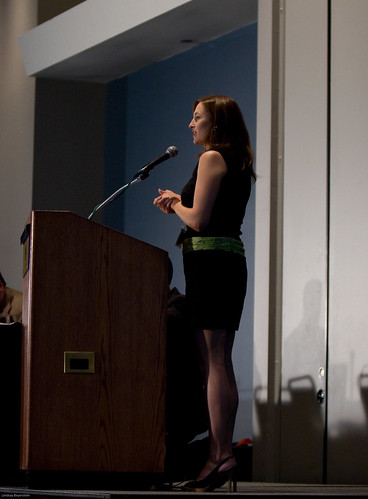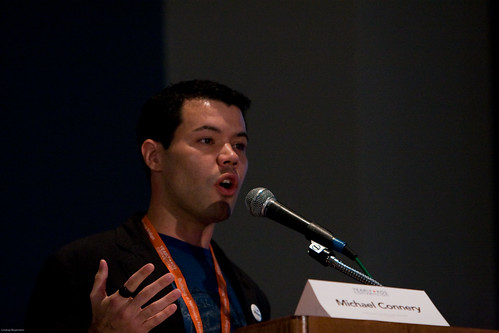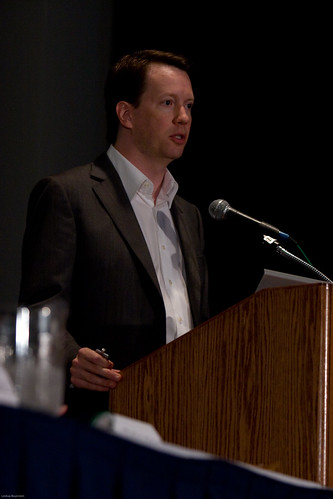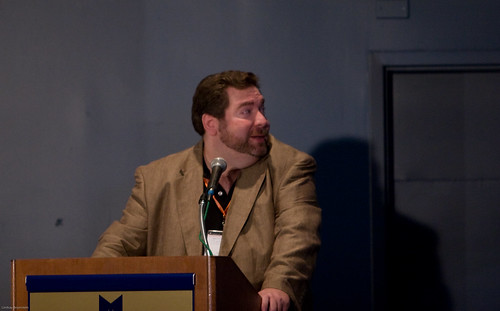
Apologies for the silence; as I mentioned, August is a crazy month for me. I hope to get back to some heavier science posts some point here, but those will, unfortunately, have to wait a bit. In the meantime, I did want to say a bit about last week's science discussions at YearlyKos, featuring (L-R) Ed, Sean, and Chris; More after the jump. (All photos courtesy of Lindsay).
First, a bit about what went on. I arrived there Thursday, and the first order of events was to get ready for the Science bloggers' caucus Thursday afternoon. This was pretty much a no-holds-barred, unscripted conversation about whatever the audience wanted to discuss. I acted as moderator and because Sean and Ed were already on hand, I brought them up on stage with me as well to help field questions. I was worried about attendance and interest, but the audience certainly didn't disappoint. The room was well filled, and after I gave a brief introduction, the questions and comments were non-stop for an hour and a half (our allotted time). As Sean noted, it was certainly refreshing to have people volunteer to speak up, when sometimes facing a room as a professor all you see are people staring back begging not to be called upon!
As far as what was discussed, it really ran the spectrum. There was much discussion about what scientists could do to influence policy, and become more politically active (in my opinion a very tough sell, but certainly something that many of the participants were encouraging). Framing was brought into it a bit, with the suggestion that we stamp in the mantra that good policy requires good information, and work on bringing more scientists into politics that way.
 There were also several suggestions on populations we're overlooking right now. One audience member suggested we more actively recruit retired scientists to lend their voices, as they are less likely to encounter many of the issues working scientists have regarding outspoken activism. It was also pointed out that young people (high school and college age) represent a largely untapped resource, both as science and political advocates. This is something I'm very interested in, and I spoke with a few people who have some ideas on how to better reach these groups (especially the young people), but if anyone else has any suggestions, I'd love to hear them in the comment section. Overall, I was very pleased with how the caucus went, and very impressed with the level of participation and interest.
There were also several suggestions on populations we're overlooking right now. One audience member suggested we more actively recruit retired scientists to lend their voices, as they are less likely to encounter many of the issues working scientists have regarding outspoken activism. It was also pointed out that young people (high school and college age) represent a largely untapped resource, both as science and political advocates. This is something I'm very interested in, and I spoke with a few people who have some ideas on how to better reach these groups (especially the young people), but if anyone else has any suggestions, I'd love to hear them in the comment section. Overall, I was very pleased with how the caucus went, and very impressed with the level of participation and interest.
 Friday, then, was the science panel, with a more formal structure (the three speakers I mentioned above, each giving 20-30 minute talks) followed by a short question-and-answer period. I again moderated the event, which was also filmed by C-SPAN (no word, as far as I know, about whether they'll actually air it). After I introduced everyone, Chris Mooney started off the talks, discussing the battle over hurricanes and global warming in a very entertaining presentation. Chris outlined the current controversy regarding storms and whether they've been strengthened in recent years by climate change, and noted that we must act based on the best information we have available--because our knowledge will never be complete.
Friday, then, was the science panel, with a more formal structure (the three speakers I mentioned above, each giving 20-30 minute talks) followed by a short question-and-answer period. I again moderated the event, which was also filmed by C-SPAN (no word, as far as I know, about whether they'll actually air it). After I introduced everyone, Chris Mooney started off the talks, discussing the battle over hurricanes and global warming in a very entertaining presentation. Chris outlined the current controversy regarding storms and whether they've been strengthened in recent years by climate change, and noted that we must act based on the best information we have available--because our knowledge will never be complete.
 Sean Carroll was slated to go next, speaking on dark energy and dark matter. I have to say that, during Chris's talk, I was feeling a bit bad for Sean. Chris was a great entertainer in addition to getting the science across, and I knew Ed had a history as a stand-up comedian, so I was thinking about poor Sean, talking about astrophysics and probably losing some of the audience. I realized quickly that my worry was incredibly misplaced, as Sean managed to make his topic not only very accessible and interesting, but funny as well. And though it was the most science-heavy of the three talks, he did manage to deviously include a lesson on the nature of science in his talk as well, noting that most of the universe is a strange place, and very counter-intuitive. (As noted elsewhere, he summarized recent findings about dark matter and energy by saying, "The good news is that we understand a lot about the universe. The bad news is that it makes no sense.") He noted, however, that we uncovered this by closely examining the evidence, no matter what weird or unexpected conclusions it led to--and this is what science is all about.
Sean Carroll was slated to go next, speaking on dark energy and dark matter. I have to say that, during Chris's talk, I was feeling a bit bad for Sean. Chris was a great entertainer in addition to getting the science across, and I knew Ed had a history as a stand-up comedian, so I was thinking about poor Sean, talking about astrophysics and probably losing some of the audience. I realized quickly that my worry was incredibly misplaced, as Sean managed to make his topic not only very accessible and interesting, but funny as well. And though it was the most science-heavy of the three talks, he did manage to deviously include a lesson on the nature of science in his talk as well, noting that most of the universe is a strange place, and very counter-intuitive. (As noted elsewhere, he summarized recent findings about dark matter and energy by saying, "The good news is that we understand a lot about the universe. The bad news is that it makes no sense.") He noted, however, that we uncovered this by closely examining the evidence, no matter what weird or unexpected conclusions it led to--and this is what science is all about.
 Ed batted clean-up, discussing how to counter the religious right at the local level, by running for school board. His talk was probably the least "science-y" out of the three, but it was perfect for the venue, as it highlighted a practical way to participate in politics and, at the same time, be an advocate for good science education. After all, fundamentalists have been doing this (successfully, I might add) for awhile now, so it's time for progressives to beat them at their own game. And yes, Ed cracked 'em up as well.
Ed batted clean-up, discussing how to counter the religious right at the local level, by running for school board. His talk was probably the least "science-y" out of the three, but it was perfect for the venue, as it highlighted a practical way to participate in politics and, at the same time, be an advocate for good science education. After all, fundamentalists have been doing this (successfully, I might add) for awhile now, so it's time for progressives to beat them at their own game. And yes, Ed cracked 'em up as well.
The Q&A lasted for about 15 minutes following the talks, and stuck both to specific questions about the material presented and broader-view comments. Overall, I thought the panel was a perfect complement to the caucus, though I still wish the scheduling had been a bit different and the panel discussion could have come first. But that's my only annoyance, and it's a minor one.
In addition to the folks mentioned above, a world of thanks must go out to DarkSyde at the DailyKos, even though he ultimately wasn't able to make it at the last minute. I was able to see, however, all the work he put into this, from the big picture to the tiniest details, so much appreciation goes out to him for setting everything up. As far as our on-site guru, another blogger at DailyKos, "Unstable Isotope" helped make sure all the technical issues ran smoothly (and indeed they did, without a hitch). I'm very pleased to have been a part of this, and hope C-SPAN either airs or somehow releases the video--obviously I'm biased, but the talks really are a must-see.
Finally, you know what they say about all work and no play. In between the caucus and the panel, I was able to meet many interesting people working in varied areas of policy (including several interested specifically in science policy). I met Ed and Sean for the first time (as well as Jennifer Ouellette, aka Sean's Future Spouse). I also went out to dinner Friday evening with Ed, Katherine Sharpe, Karmen and her husband, a representative of Revere/revere, and Pandas Thumb reader/commenter Rich Hughes, who generously bankrolled the dinner at a great Hawaiian restaurant. It was a quick trip, but a great time, and I hope those in attendance carry some of what they heard back to their own groups and websites.
Further reading:

Sorry I couldn't stick around longer. I was expecting a late night call from ED for bail money for you all. I'm not sure about "well done tuna", though...
*rearranges post it notes on screen*
Fatheaded Ed Brayton has no credibility. He kicked me off his blog permanently because he disagreed with my literal interpretation of a federal court rule.
Tara, you have seen through my innocent exterior to the devious schemer underneath. Thanks for moderating, it was great to meet you in person!
I made it to the caucus on Thursday -- nicely done fielding commentary from a rather insistent bunch (!) and molding it into something productive.
Regarding building youth activism for science awareness in politics, the best prospects might lie with encouraging energetic individuals and giving them a platform. Counting on young people in politics as a mass group can be a perenially disappointing exercise, but getting those with drive and talent a wider audience could start influencing the public's awareness of science's place in policy.
Since I didn't get a chance to elbow into the discussion there, I'll link back to a comment on Darksyde's pre-caucus Daily Kos thread and add one more point: I think we're in an age like that of Galileo, though a couple of orders of magnitude better in terms of societal attitude, when powerful people profit from public acquiescence to patent falsehoods. Galileo got into a whole mess of hurt for voicing the observable truth to a large audience, before authorities who didn't like their lies contramanded and their power diminished. When we encounter people in public discourse who insist upon willfull ignorance, in addition to promoting objective reality, let's not hesiatate to apply some well-deserved ridicule.
Hello Tara, great write-up.
The "good policy requires good information" mantra makes a lot of sense, and should prove attractive not only to Democrats but to many busines-oriented Republican as well.
Will we hear some of the main Democratic contenders introduce that language-and specific proposals to back it up?
Thanks for this summary. I was wondering how the YearlyKos science blogging panel went.
Regarding
I have quite a bit of experience organizing grad students and post-docs to facilitate dialogue between scientists, policy makers and the public about topics that impact science and society. Five grad students founded the Forum on Science Ethics and Policy (FOSEP) at the University of Washington three years ago, and have since hosted more than 50 events for the public, the UW community and our members. We have found our methods highly effective at generating civic scientists. One of our founders is a congressional science adviser, one is an NAS fellow, another is an AAAS fellow, and then there are the scientists who can better interact with the media and lawmakers. For example, I contributed definitions for blastocyst for 2005 stem cell bill in Washington State.
You are right to recognize young scientists as an untapped resource. FOSEP members surprise me with the energy and commitment to an unpaid activity 'on the side.' In attracting high profile speakers to Seattle (Neal Lane last year, Mooney and Nisbet this October) we are able to connect with media outlets and local science outreach groups (the Pacific Science Center, our local science cafe, etc.) We raise our funding in small amounts (~$1K) from departments across campus and from our Graduate School & Office of Research.
I invite you to check out our mission and last year's annual report. (I am still working on this year's!) If you would like to chat about this or have any questions, send me an email. We would like to develop a handbook that could be used to establish similar efforts on different campuses.
I think I mis-entered a previous comment, so sorry for the potential repeat. With regard to:
It's not exactly high school, but the student group called the Forum on Science Ethics and Policy at the the University of Washington has made some strides into this task.
thank you wery mach
thanks for all